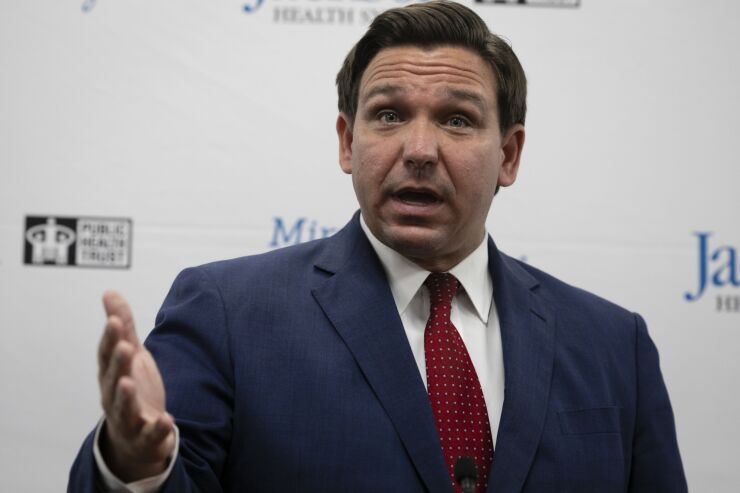Florida Gov. Ron DeSantis' $96.6 billion budget proposal for fiscal year 2021-2022, increases spending and counts on debt service savings of $40.8 million and bond savings of $64.2 million.
Over half of the $4.3 billion rise in the budget proposal, $2.6 billion, is related to spending increases due to the COVID-19 pandemic.
“The ‘Florida Leads’ budget builds on key investments in education, the environment, health and human services, public safety and more, while safeguarding taxpayer dollars and maintaining strong fiscal reserves,” DeSantis said Thursday.

Florida’s $6.6 billion in reserves is nearly 6% of the budget. The governor said this leaves ample resources for unforeseen expenses in 2021 related to the COVID-19 pandemic and to the hurricane season. The reserves consist of $2.2 billion in unallocated general revenue, $1.7 billion in the budget stabilization fund, $1.7 billion in unallocated trust funds and $1 billion in tobacco reserves.
On Thursday, the state Department of Health confirmed 11,423 additional cases of COVID-19, bringing the state’s known total to 1,687,594, the Miami Herald reported. Also, 202 resident deaths were announced, with the resident death toll rising to 26,035.
DeSantis’ budget proposal now goes to the state Legislature for debate, modification and approval. The governor has line-item veto power over the final budget.
The proposed budget recommends cuts of more than $1 billion in certain outlays, including $873.3 million in general revenue funds, $228.3 million in trust funds and the elimination of 169 job positions. The general revenue section of the budget totals $35.8 billion.
Other economies in budget plan include debt service savings of $40.8 million and bond savings of $64.2 million. Additional cuts of $408.2 million are being made through administrative and operational efficiencies and Medicaid and KidCare will see savings of $554.7 million due to enhancements of the Federal Medical Assistance Percentages.
Florida’s general obligation bonds carry triple-A ratings from Moody’s Investors Service, S&P Global Ratings and Fitch Ratings. As of June 30, 2020, Florida had $19.2 billion of direct debt outstanding, a $1.4 billion decrease from the prior fiscal year, according to the state Division of Bond Finance. Over the past 10 years, the division has refunded over 85% of the state's outstanding debt, which lowers the cost of borrowing.
In December, Florida's elected Cabinet
The state’s unfunded pension liability totaled $36 billion as of June 30, 2020. While the program is 82% funded, the budget includes $52.9 million to implement recommendations of an independent actuary and fully fund recommended annual contributions.
The budget also proposes a $65 million tax cut. At $1,917, Florida’s per capita state tax burden is the fourth lowest among all U.S. states. The cuts include an eight day back-to-school sales tax holiday and a 10-day disaster preparedness sales tax holiday.
Turning to the environment, the budget creates the “Resilient Florida” program that will work to meet the challenges of rising sea levels, intensified storms and local flooding. It provides $1 billion over four years to the program, which will give grants to state and local governments for environmental projects.
“Our state’s environment and water resources make Florida unique and are critical to Florida’s identity. The protection of these resources is a top priority of the Florida Leads budget,” DeSantis said.
Education spending also gets a boost under DeSantis' proposal. The budget raises funding for elementary school education, with an additional $50 million going for K-12 teacher salaries. The budget also includes $1.4 billion in funding for early child education. The Florida College System would receive $1.2 billion in funding while the State University System would get $2.7 billion.
Looking to the future, the governor stressed the importance of transportation and infrastructure.
“Florida's ability to grow and prosper is a result of having one of the best transportation systems in the country,” he said Thursday. “In the Florida Leads budget we will continue that trend through significant investments for Floridians and the millions of tourists coming to the state.”
The budget includes $10.4 billion for the Florida Department of Transportation, including $9.47 billion for the state transportation work program, a five-year plan for infrastructure projects.
The budget includes $2.5 billion for highway construction, $1 billion in road resurfacing, $122.6 million in seaport infrastructure enhancements, $331 million for aviation improvements, $516 million for repairs of 89 bridges and replacement of 18 bridges, $717 million for rail/transit programs and $172.2 million for safety initiatives.
“Investments in transportation are crucial to our communities, our economy, and the future of our state,” said FDOT Secretary Kevin Thibault.





